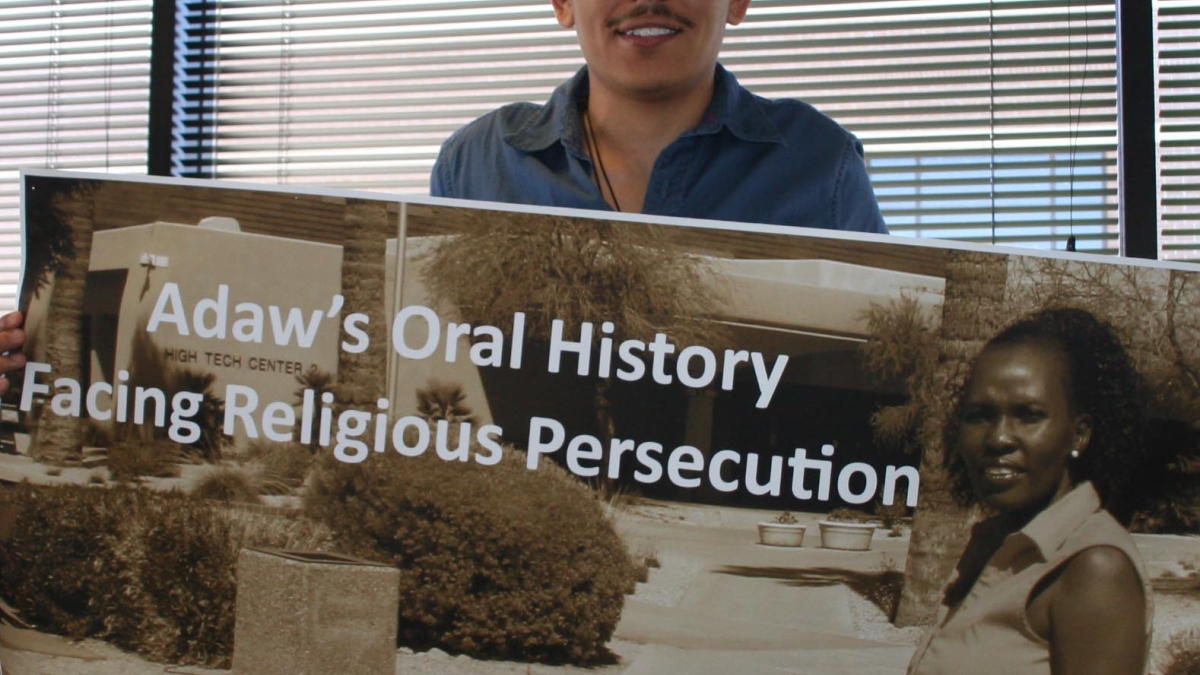From Sudan’s Lost Boys to slam poetry, student expands his horizons

When Arthur Morales enrolled in ASU’s New College of Interdisciplinary Arts and Sciences, he was already a published poet. Morales, who earned an associate’s degree at Glendale Community College and only applied to ASU, has made the most of his two years at the West campus, further exploring his interest in poetry, developing expertise in video production, and producing oral histories from the Lost Boys of Sudan.
Upon completing his bachelor’s degree in English, Morales now aspires to earn a Master of Arts in Interdisciplinary Studies (MAIS) degree from New College. Then it’s on to a doctoral program in English.
“I want to become an English professor and also continue producing oral histories and capture some interesting stories from people right here in Arizona,” said Morales, a native of Glendale, Ariz., whose father also received his ASU bachelor’s degree at the West campus.
It was through New College’s Cross-Cultural Writing course with faculty member Julie Amparano that Morales learned about the Lost Boys of Sudan, who defied daunting odds to survive a brutal civil war that left many of them orphans. There is now a Lost Boys refugee population in metropolitan Phoenix, and Amparano’s class worked on collecting their oral histories.
“Arthur’s oral history with a Lost Boy, Tut, went on to win first place in New College’s Undergraduate Student Research and Creative Projects Expo last year,” Amparano said. “This year, he entered an oral history for a Lost Girl, Adaw, and won third place.”
“After sitting through an interview with Tut and hearing how he faced loss, fear and hopelessness, I knew that I wanted to continue archiving oral histories on the Lost Boys of Sudan,” Morales said. “I have learned so much from Tut’s and Adaw’s oral history. It has made me come to appreciate the freedoms we all have in the United States. I also learned that we all have a story to share. My mission is to capture those stories that are not heard and be able to create compelling video productions to archive these historical events.”
Morales was able to make use of New College’s video production equipment and facilities to develop his video skills.
“When I entered two of my research projects for the New College Expo, I did not want to limit information to a three-fold poster about my research but also add a video production to explain my thesis and provide examples to support my thesis,” he explained.
His interests in video and poetry led Morales to work with Heather Maring, a faculty member in the Department of English at ASU’s Tempe campus, on a research project titled “The Ethnopoetic Approach and the Slam Poem.”
“The ethnopoetic approach has been described as focusing intensely on the recording and translating of poetry in a manner that is faithful to its artistic performance,” Morales said. “I created a thesis asserting that slam poetry is not meant to be read or judged in flat prose format because it is a live performance that includes an arrangement of body movements, hand gestures, facial expressions, voice intonations, and a relationship between the poet and the audience that are essential to the poem.”
Morales is now working to initiate change in the poetry submission rules for Canyon Voices, the West campus online literary magazine, to allow slam poetry to be submitted in video format that captures the full body of the performer. His work on Canyon Voices has been another horizon-expanding experience.
“For the past three semesters, I have worked with the best undergraduate poetry editors on campus,” he said. “Throughout this time I have reviewed and edited more than 900 poems. I have had the pleasure to work with established poets like Dwight Cosper, Shawnte Orion and Jessie Jordan. I have learned so much about the poetry genre during my time as an editor.”
Morales’ own poem, “It’s All I Want,” was published in the 2008 book “Collected Whispers.” He has since had additional works selected for inclusion in Canyon Voices.
Amparano is not the only New College faculty member impressed by Morales’ intellect and work ethic.
“Arthur was always an insightful and enthusiastic contributor to class discussion,” said Patrick Bixby, who was Morales’ professor for a History of Film class. “He wrote a series of impressive essays on a range of topics related to the history of film. For instance, he produced a detailed analysis of the noir mise-en-scène in John Huston’s ‘The Maltese Falcon.’”
Amparano, meanwhile, has obtained two grants supporting her Lost Boys project, called Lost Boys Found. She has hired Morales to work on the project in a paid capacity. Morales hopes the effort leads to the publication of a book chronicling the amazing and inspiring stories of the Lost Boys.
“I like to say Arthur is one of those rare 360-degree students,” Amparano said. “He engages in the classroom, teams up with students, and finds research and teaching opportunities.”

